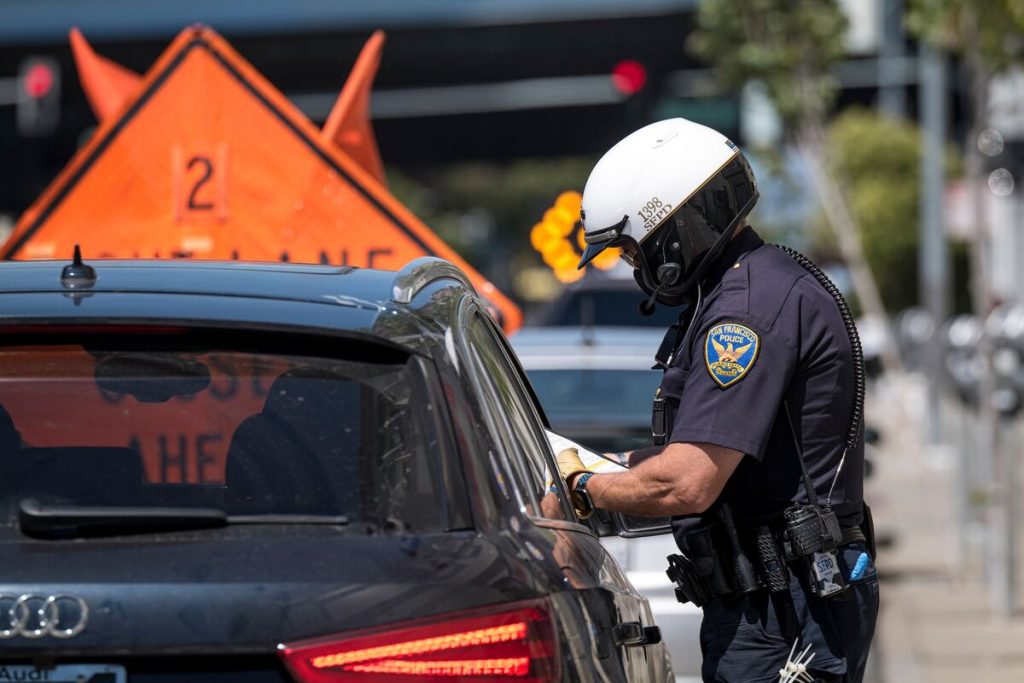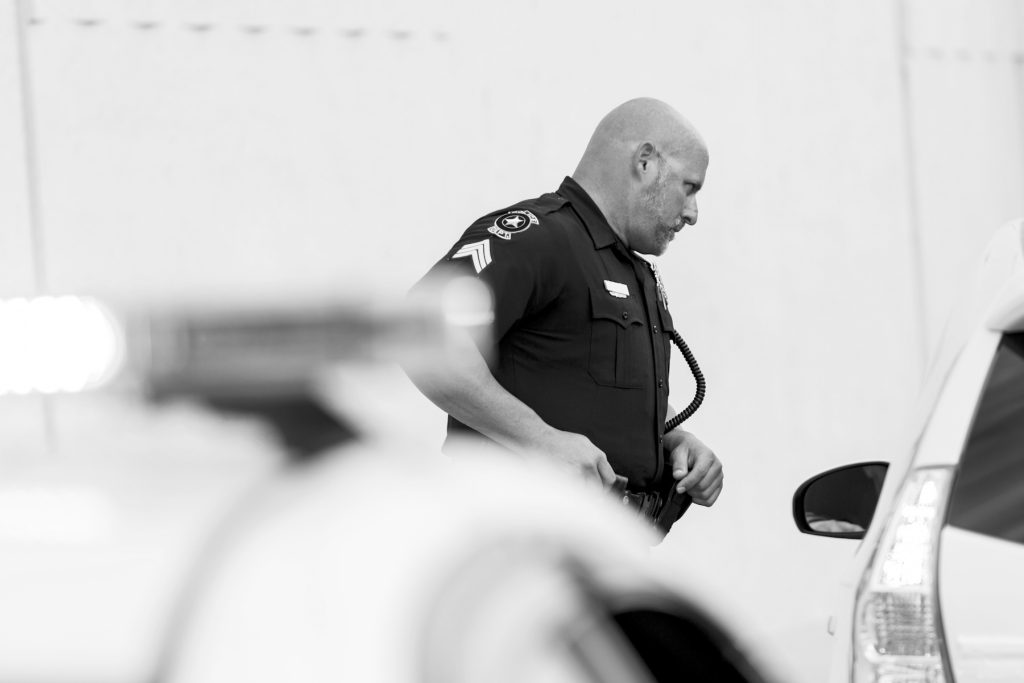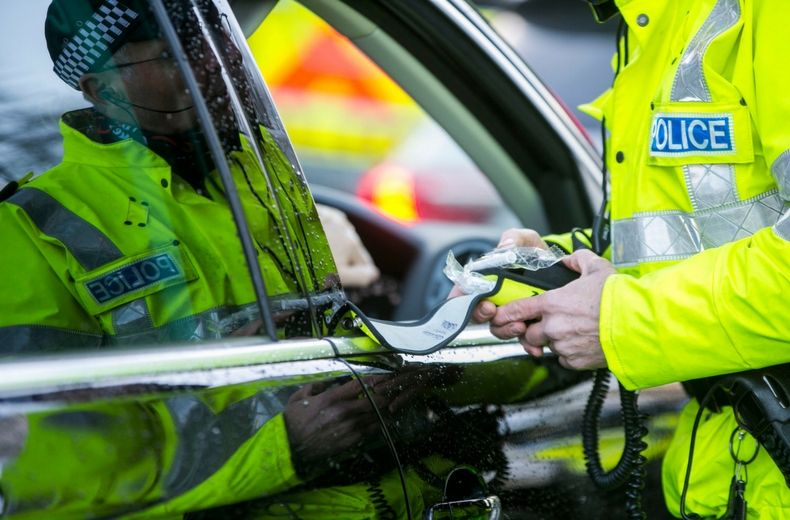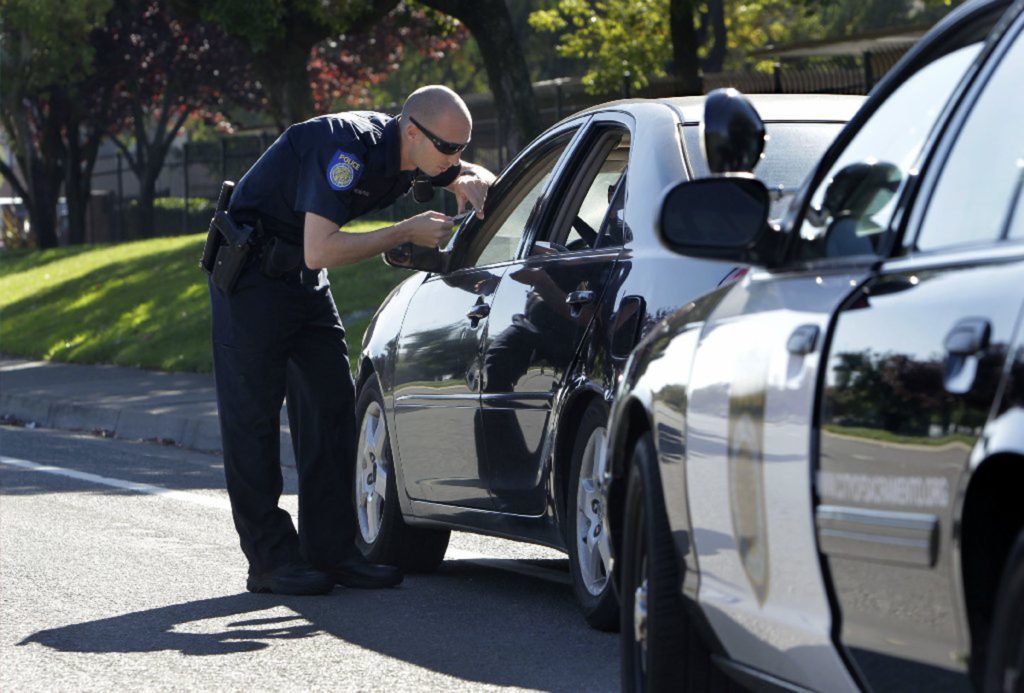Yes, in the U.K., the police can pull you over without a specific reason. They have the authority to stop vehicles for routine checks and to ensure compliance with various traffic and safety regulations.
This power is granted under Section 163 of the Road Traffic Act 1988. Police officers can stop a vehicle to ensure that the driver is properly licensed and insured and the vehicle is roadworthy.
So, picture this: you’re cruising down the scenic roads of the U.K., enjoying the drive, when suddenly you see those flashing blue lights in your rearview mirror. Now, you might be wondering, can the police pull you over for no apparent reason?
Let’s unravel the mystery together and explore the rules and reasons behind those unexpected roadside encounters. Get ready for a journey through the intricacies of traffic stops in the U.K.!
Legal Basis for Traffic Stops

Overview of the Road Traffic Act 1988:
The Road Traffic Act 1988 constitutes a crucial piece of legislation in the United Kingdom, establishing the legal framework governing diverse facets of road traffic regulations.
This comprehensive statute addresses a broad spectrum of matters pertaining to the operation of vehicles on public roads, encompassing licensing, insurance requirements, and the regulation of traffic offenses.
Grounds for police to stop a vehicle:
The Road Traffic Act 1988 and other relevant legislation empower law enforcement officers to stop vehicles under certain circumstances. The grounds for police to stop a vehicle may include:
Routine Checks: Police officers have the authority to conduct routine checks on vehicles to ensure compliance with legal requirements such as valid driver’s licenses, vehicle insurance, and roadworthiness.
Vehicle Defects: If a law enforcement officer observes a defect or problem with a vehicle, such as a broken taillight or faulty brakes, they may stop the vehicle to address the issue and ensure road safety.
Suspicion of Criminal Activity: Police can stop a vehicle if they reasonably suspect it is involved in criminal activity, such as transporting illegal substances or being connected to a recent crime.
DUI (Driving Under the Influence): If there is reason to believe that a driver is under the influence of alcohol or drugs, law enforcement can stop the vehicle for further investigation.
The concept of “reasonable suspicion” in traffic stops:
The concept of “reasonable suspicion” is crucial in traffic stops and is often a legal standard that law enforcement must meet to justify stopping a vehicle.
These facts should be more than just a hunch or intuition; they should be based on observable behavior or circumstances that give rise to a reasonable belief that something is amiss.
The requirement of reasonable suspicion safeguards against arbitrary or discriminatory stops, ensuring that law enforcement actions are based on objective grounds
Police Powers and Procedures
Authority to require drivers to stop:
Police officers have the authority to require drivers to stop their vehicles for various reasons, including routine traffic stops, suspicion of a traffic offense, or other concerns related to public safety.
This authority is granted under the Road Traffic Act 1988 and other relevant legislation. When signaled by a police officer, drivers are generally obligated to pull over safely and comply with the officer’s instructions.
Refusing to stop when lawfully requested by a police officer may result in legal consequences, as it could be considered an offense.
Once the vehicle has stopped, the police officer may proceed with further actions based on the specific circumstances that led to the stop.
Requesting identification and vehicle documentation:
Upon stopping a vehicle, police officers have the authority to request identification and documentation from the driver. This typically includes:
- Driver’s License: Officers may ask for the driver’s license to verify that the individual is legally permitted to operate a motor vehicle.
- Vehicle Registration: Police may request the vehicle registration to confirm that the vehicle is properly registered and the information matches the details of the stopped vehicle.
Random Stops and Routine Checks
Police authority to conduct random stops:
In some jurisdictions, police officers may have the authority to conduct random stops, also known as discretionary stops, without requiring a specific reason or suspicion of wrongdoing.
The legal basis for random stops may vary depending on the jurisdiction’s laws.
Public Safety and Crime Prevention: Random stops are often justified as a means to enhance public safety and deter criminal activity. Law enforcement may argue that conducting stops without prior suspicion allows them to identify and address potential issues before they escalate.
Legislation and Legal Standards: The authority for random stops is typically granted by specific legislation or legal standards.
The legislation may outline the circumstances under which law enforcement can conduct random stops and the limitations on such stops to ensure they are not arbitrary or discriminatory.
Jurisdictions must strike a balance between empowering law enforcement to maintain public safety and respecting individuals’ rights to be free from unwarranted intrusions.
Criteria for routine vehicle checks:
Routine vehicle checks are typically conducted for specific purposes, such as ensuring compliance with traffic laws, verifying driver documentation, and promoting road safety. The criteria for routine vehicle checks may include:
Time and Location: Law enforcement may choose to conduct routine checks at specific times or in certain locations known for higher traffic violations or criminal activity.
Vehicle Characteristics: Officers may target certain types of vehicles or those displaying specific characteristics that raise suspicion, such as commercial vehicles or vehicles with modifications that may affect roadworthiness.
Observations of Behavior: Officers may base routine checks on observed behavior, such as erratic driving, excessive speeding, or other indicators of potential violations.
Routine Traffic Safety Inspections: Some routine checks may focus on ensuring vehicles meet safety standards, with inspections covering elements like lights, brakes, and tires.
Proportionality and Non-Discrimination: To ensure a balance between individual rights and public safety, authorities should implement measures to prevent discrimination and ensure that stops are based on objective criteria rather than profiling based on race, ethnicity, or other protected characteristics.
Legal Oversight and Accountability: Proper legal oversight and accountability mechanisms, such as judicial review and internal affairs investigations, can help ensure that random stops and routine checks are conducted lawfully and with respect for individuals’ rights.
The implementation of clear legal standards, oversight mechanisms, and training for law enforcement officers is essential to strike an appropriate balance between protecting individual rights and promoting public safety.
Discrimination and Profiling Concerns

Addressing concerns about racial or ethnic profiling:
Concerns about racial or ethnic profiling during traffic stops are significant, as they raise questions about fairness, equality, and the protection of civil rights. To address these concerns, law enforcement agencies, and policymakers may take several measures:
Training Programs: Implementing training programs for law enforcement officers to raise awareness about the impact of racial and ethnic profiling. This training can emphasize the importance of treating all individuals fairly and without bias.
Policy Development: Developing and enforcing clear policies within law enforcement agencies that explicitly prohibit racial or ethnic profiling.
Steps taken by law enforcement to prevent discrimination:
You can help prevent discrimination and profiling during traffic stops by taking proactive steps in law enforcement.
Body-Worn Cameras: Implementing the use of body-worn cameras by officers during interactions with the public. Body cameras can provide an objective record of interactions and serve as a tool for accountability.
Supervision and Accountability: Establishing strong supervisory oversight and accountability mechanisms within law enforcement agencies. This includes reviewing and investigating complaints of discriminatory behavior and taking appropriate disciplinary actions when necessary.
Community Policing Strategies: Implementing community policing strategies that prioritize building positive relationships between law enforcement and the community.
This approach emphasizes collaboration and problem-solving rather than solely focusing on enforcement.
Diversity and Inclusion Initiatives: Promoting diversity within law enforcement agencies and fostering an inclusive culture. Diverse representation within the police force can enhance understanding and trust between officers and the communities they serve.
Know Your Rights: What to Do During a Traffic Stop
Advice for drivers when pulled over by the police:
Remain Calm: Stay calm and pull over to a safe location as soon as it is safe to do so. Turn off your engine and remain in the vehicle unless otherwise instructed.
Be Polite and Cooperative: Be respectful and cooperative with the police officer. Follow their instructions and provide requested documents, such as your driver’s license, vehicle registration, and proof of insurance.
Limited Disclosure: You are not obligated to answer questions beyond providing identification and basic information. You have the right to remain silent, and anything you say can be used against you in court.
Refusing Searches: You have the right to refuse a search of your vehicle. Clearly and respectfully state that you do not consent to a search. However, do not physically resist a search if the officer proceeds without your consent.
Recording the Interaction: In many jurisdictions, you have the right to record the interaction with the police using your smartphone. Inform the officer if you plan to do so, but do not interfere with their duties.
Ask If You’re Free to Leave: If you are not under arrest, you have the right to ask if you are free to leave. If the officer indicates that you are free to go, do so calmly.
Rights regarding searches of the vehicle or person:
Searches Without Consent: You have the right to refuse a search of your vehicle or person if the officer does not have a warrant or probable cause. Clearly state that you do not consent to the search.
Probable Cause: If a police officer believes a crime has occurred, they can search without a warrant. Even so, you have the right to assert yourself and state that you don’t agree with the search.
Understanding Warrants: If the officer has a search warrant, you may not have the right to refuse the search. In such cases, it’s advisable to comply with the search while making it clear that you are doing so under protest.
Record the Search: If a search occurs, try to document the details. Take note of the officer’s badge number, name, and any other relevant information. If possible, record the interaction.
Dealing with disputes or concerns during a traffic stop:
Stay Calm: Maintain your composure even if you disagree with the officer. Getting confrontational can escalate the situation.
Cases and Precedents

Examining legal cases related to unjustified traffic stops:
Whren v. United States (1996): In this case, the U.S. Supreme Court held that as long as a police officer has a legitimate reason to initiate a traffic stop, the stop is constitutionally valid, even if the officer’s subjective motivations may involve unrelated suspicions.
This decision has been cited in cases where individuals challenged traffic stops as pretextual, arguing that the true reason for the stop was unrelated to a traffic violation
Impact of legal decisions on police procedures:
Training and Policies: Court rulings and precedents often lead law enforcement agencies to update their training programs and policies to ensure that officers are aware of and comply with legal standards.
This may include specific guidance on conducting traffic stops, searches, and interactions with the public.
Accountability and Oversight: Legal decisions can contribute to increased accountability and oversight within law enforcement agencies.
Agencies may implement internal review processes and mechanisms to ensure that officers adhere to legal standards during traffic stops.
Public Awareness: Significant legal decisions often raise public awareness about individual rights during traffic stops and interactions with law enforcement.
Legislative Changes: Some court rulings may prompt legislative changes to address specific issues or concerns related to traffic stops. Legislatures may enact new laws or amend existing ones to align with legal precedents and protect individuals’ rights.
It’s important to note that legal interpretations and standards may evolve, and the impact of court decisions on police procedures may vary across jurisdictions.
FAQs
Can the police pull me over in the U.K. without a reason?
No, the police in the U.K. generally need a valid reason, such as a traffic offense or suspicion of criminal activity, to pull you over
Can the police pull me over for a vehicle check even if I haven’t committed an offense?
Yes, the police have the authority to conduct routine vehicle checks to ensure compliance with legal requirements, even if you haven’t committed a specific offense.
What should I do if I get pulled over by the police in the U.K.?
Pull over safely, remain calm, and cooperate with the officer. Provide requested documents, and if you have concerns, address them later through appropriate channels.
Can I refuse to stop by the police in the U.K.?
No, refusing to stop when lawfully requested by the police is an offense. Failing to stop can lead to legal consequences.
Can the police use sniffer dogs during a routine traffic stop in the U.K.?
The use of sniffer dogs during a routine traffic stop is generally allowed in the U.K. if there is reasonable suspicion of the presence of illegal substances.
Can the police stop me solely based on my appearance or ethnicity in the U.K.?
No, stops based solely on appearance or ethnicity are considered discriminatory. Stops should be based on objective criteria and reasonable suspicion.
Do I have the right to record a traffic stop in the U.K.?
Yes, you generally have the right to record a traffic stop in the U.K. Inform the officer if you plan to do so, but do not interfere with their duties.
Conclusion
When the police pull you over, it’s important to stay calm and be polite. You have rights, like the right to refuse searches, and you can ask if you’re free to leave.
Remember, being aware of your rights and acting can help ensure a smooth interaction during a traffic stop
.











